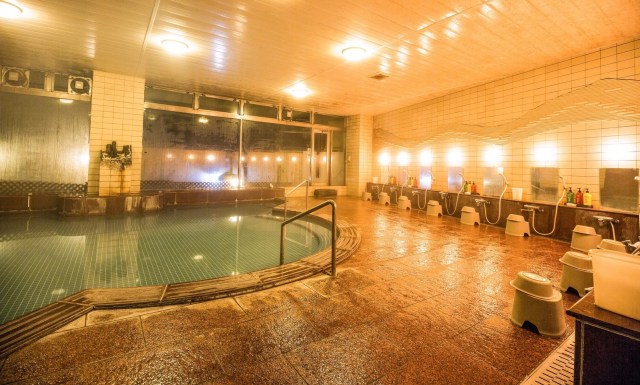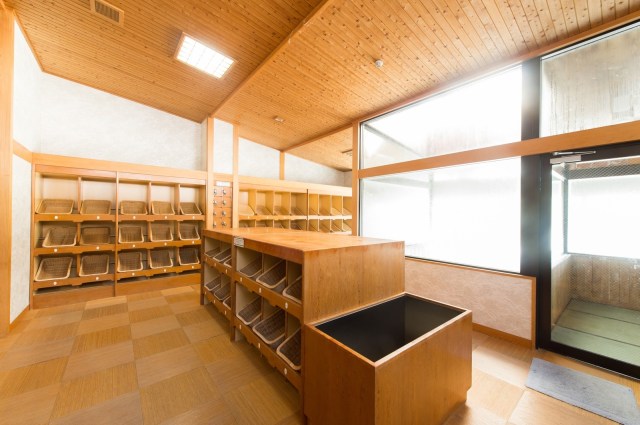
Current age limit is well above the cutoff line for embarrassment, survey says.
In Japan, communal bathing at hot springs (onsen) or neighborhood public baths (sento) is usually a single-sex activity. An exception, though, is made for young children. In much the same way as no one freaks out over a father taking his preschool-age daughter into a public men’s room to use the bathroom, or a mother taking her son of the same age into the ladies’ room, little kids can generally use either the men’s or women’s bath, as long as they’re accompanied by a parent of the corresponding sex.
Of course, at some age that leniency expires, and boys become barred from the women’s bath, and girls from the men’s. Culturally speaking, the cut-off age is sort of a gray area, but in Tokyo the law currently says that children in the opposite sex’s bath area must be no older than 9. However, that’s likely to change soon, as according to news service FNN Prime the Tokyo Metropolitan Government will soon be knocking the age limit down to six years old.
Japan’s Ministry of Health, Labor and Welfare conducted a survey, asking at what age it becomes “embarrassing” for a child to be in the opposite sex’s bath. Whether the responses came from children themselves or adults is unclear, but the results were:
● 5 years old: 16.1 percent
● 6 years old: 27 percent
● 7 years old: 21.2 percent
● 8 years old: 13.4 percent
● 9 years old: 7 percent
● Other: 15.3 percent
A key factor in six years old being the most common answer is likely that that’s also the age at which most Japanese children start elementary school. It’s possible that a six-year-old in a neighborhood sento could theoretically end up having to share a bathtub with an opposite-sex classmate who’s with their respective-sex parent, which could make for an uncomfortable atmosphere in the classroom.
▼ Changing rooms for public baths usually don’t offer much privacy either.
That might make it sound like limiting opposite-sex bath admission to children five or younger would be the more sensible decision, but with most Japanese children celebrating their sixth birthday before finishing preschool, it’s likely the switch to a “six years old or younger” rule is considered the simpler, most easily implemented change.
FNN claims that at the urging of the national government, the new age limit for mixed bathing in Tokyo is likely to be formally approved by the Tokyo Metropolitan Assembly in June, and put into effect shortly thereafter.
Source: FNN Prime Online
Top image: Pakutaso
Insert image: Pakutaso
● Want to hear about SoraNews24’s latest articles as soon as they’re published? Follow us on Facebook and Twitter!


 Japanese dating site’s picture of ideally attractive woman: young, no sleeves, college education
Japanese dating site’s picture of ideally attractive woman: young, no sleeves, college education Japanese women show overwhelming resistance to unisex bathrooms in survey
Japanese women show overwhelming resistance to unisex bathrooms in survey How not to bathe at a public bathing facility in Japan
How not to bathe at a public bathing facility in Japan Meet the the 90-year-old Japanese woman who is McDonald’s Japan’s oldest female employee
Meet the the 90-year-old Japanese woman who is McDonald’s Japan’s oldest female employee More than one in three Japanese working women in survey would rather be housewives
More than one in three Japanese working women in survey would rather be housewives How to order snacks on a Shinkansen bullet train in Japan
How to order snacks on a Shinkansen bullet train in Japan Hello, cosmetics! Clinique teams up with Hello Kitty this summer for first-time collaboration
Hello, cosmetics! Clinique teams up with Hello Kitty this summer for first-time collaboration Demon Slayer: Kimetsu no Yaiba gets new roller coaster attractions and food at Universal Studios Japan
Demon Slayer: Kimetsu no Yaiba gets new roller coaster attractions and food at Universal Studios Japan A visit to the best UFO catcher arcade in the universe!
A visit to the best UFO catcher arcade in the universe! To combat declining birth rate, Japan to begin offering “Breeding Visas” to foreigners
To combat declining birth rate, Japan to begin offering “Breeding Visas” to foreigners Spirited Away train station and submerged tracks attract Ghibli fans around Japan
Spirited Away train station and submerged tracks attract Ghibli fans around Japan Daiso DIY dessert! 100 yen store’s super-easy mochi sweets kit is our new hero
Daiso DIY dessert! 100 yen store’s super-easy mochi sweets kit is our new hero How should you respond when a Japanese person gives you a compliment?
How should you respond when a Japanese person gives you a compliment? New samurai glasses are Japan’s latest weird must-have souvenir
New samurai glasses are Japan’s latest weird must-have souvenir McDonald’s adds new watermelon frappe and fruity macaron to its menu in Japan
McDonald’s adds new watermelon frappe and fruity macaron to its menu in Japan Nintendo history you can feel – Super NES, N64, and GameCube controllers become capsule toys
Nintendo history you can feel – Super NES, N64, and GameCube controllers become capsule toys “The most Delicious Cup Noodle in history” – Japan’s French Cup Noodle wins our heart【Taste test】
“The most Delicious Cup Noodle in history” – Japan’s French Cup Noodle wins our heart【Taste test】 Starbucks releases a cute Frappuccino and Unicorn Cake…but not in Japan
Starbucks releases a cute Frappuccino and Unicorn Cake…but not in Japan Kyoto Tower mascot termination reveals dark side behind cute Japanese characters
Kyoto Tower mascot termination reveals dark side behind cute Japanese characters McDonald’s Japan’s Soft Twist Tower: A phantom ice cream only sold at select branches
McDonald’s Japan’s Soft Twist Tower: A phantom ice cream only sold at select branches Yabai Ramen: What makes this Japanese ramen so dangerous?
Yabai Ramen: What makes this Japanese ramen so dangerous? Finally! Nintendo Japan expands Switch 8-bit controller sales to everybody, Online member or not
Finally! Nintendo Japan expands Switch 8-bit controller sales to everybody, Online member or not Japanese government wants to build luxury resorts in all national parks for foreign tourists
Japanese government wants to build luxury resorts in all national parks for foreign tourists 10 things you should buy at 7-Eleven in Japan
10 things you should buy at 7-Eleven in Japan Studio Ghibli releases anime heroine cosplay dresses that are super comfy to wear
Studio Ghibli releases anime heroine cosplay dresses that are super comfy to wear Woman charged for driving suitcase without a license in Osaka
Woman charged for driving suitcase without a license in Osaka Studio Ghibli unveils My Neighbour Totoro miniature house model
Studio Ghibli unveils My Neighbour Totoro miniature house model Kyoto experiencing problems with foreign tourists not paying for bus fares, but not on purpose
Kyoto experiencing problems with foreign tourists not paying for bus fares, but not on purpose Fighting mild hunger with a Japanese soda that turns into jelly in the stomach【Taste test】
Fighting mild hunger with a Japanese soda that turns into jelly in the stomach【Taste test】 Studio Ghibli’s Howl’s Moving Castle tapestry unveiled in Japan for first time
Studio Ghibli’s Howl’s Moving Castle tapestry unveiled in Japan for first time McDonald’s new Happy Meals offer up cute and practical Sanrio lifestyle goods
McDonald’s new Happy Meals offer up cute and practical Sanrio lifestyle goods Sales of Japan’s most convenient train ticket/shopping payment cards suspended indefinitely
Sales of Japan’s most convenient train ticket/shopping payment cards suspended indefinitely Sold-out Studio Ghibli desktop humidifiers are back so Totoro can help you through the dry season
Sold-out Studio Ghibli desktop humidifiers are back so Totoro can help you through the dry season Japanese government to make first change to romanization spelling rules since the 1950s
Japanese government to make first change to romanization spelling rules since the 1950s Foreigner’s request for help in Tokyo makes us sad for the state of society
Foreigner’s request for help in Tokyo makes us sad for the state of society Ghibli founders Toshio Suzuki and Hayao Miyazaki contribute to Japanese whisky Totoro label design
Ghibli founders Toshio Suzuki and Hayao Miyazaki contribute to Japanese whisky Totoro label design Doraemon found buried at sea as scene from 1993 anime becomes real life【Photos】
Doraemon found buried at sea as scene from 1993 anime becomes real life【Photos】 Tokyo’s most famous Starbucks is closed
Tokyo’s most famous Starbucks is closed Princesses, fruits, and blacksmiths: Study reveals the 30 most unusual family names in Japan
Princesses, fruits, and blacksmiths: Study reveals the 30 most unusual family names in Japan 31 percent of Japanese women admit to cheating on lover, six percent say they got caught【Survey】
31 percent of Japanese women admit to cheating on lover, six percent say they got caught【Survey】 Apartments with no bath or shower rising in popularity among young Tokyoites, report says
Apartments with no bath or shower rising in popularity among young Tokyoites, report says Survey shows one in 20 otaku only takes a bath once a week, prompting disgust and redo
Survey shows one in 20 otaku only takes a bath once a week, prompting disgust and redo Why you probably won’t get home-made Valentine chocolate and love confession from a Japanese girl
Why you probably won’t get home-made Valentine chocolate and love confession from a Japanese girl Tokyo makes high school free for all families, even the rich ones
Tokyo makes high school free for all families, even the rich ones Rub-a-dub-dub and relax in a tub: Survey reveals wintertime bathing habits across Japan
Rub-a-dub-dub and relax in a tub: Survey reveals wintertime bathing habits across Japan Mountain Dew opening the Mountain De Yu public bath house in Tokyo for Mountain Day
Mountain Dew opening the Mountain De Yu public bath house in Tokyo for Mountain Day More young Japanese men romantically involved with older female coworkers than younger ones【Survey】
More young Japanese men romantically involved with older female coworkers than younger ones【Survey】 Medical bills to be free in all Tokyo wards for high school students, younger kids from next year
Medical bills to be free in all Tokyo wards for high school students, younger kids from next year Bathing with Pokémon? Healing species’ powers tapped for Pokémon Recovery public baths in Japan
Bathing with Pokémon? Healing species’ powers tapped for Pokémon Recovery public baths in Japan Miniature sento bathhouse range is this season’s must-buy gacha capsule toy collection
Miniature sento bathhouse range is this season’s must-buy gacha capsule toy collection Masks should still be worn indoors, majority of Japanese people in poll say
Masks should still be worn indoors, majority of Japanese people in poll say Survey reveals surprising age trend among paid subscribers of electronic comics in Japan
Survey reveals surprising age trend among paid subscribers of electronic comics in Japan Nearly 70 percent of young Japanese women self-identify as otaku in survey
Nearly 70 percent of young Japanese women self-identify as otaku in survey Elderly motorists in Japan given option to “graduate from driving” to prevent accidents
Elderly motorists in Japan given option to “graduate from driving” to prevent accidents Majority of Japanese men in their 20s say they want men-only train cars in survey
Majority of Japanese men in their 20s say they want men-only train cars in survey Japanese husbands in survey say they do half the housework and childcare, wives say “Nope!”
Japanese husbands in survey say they do half the housework and childcare, wives say “Nope!”
Leave a Reply